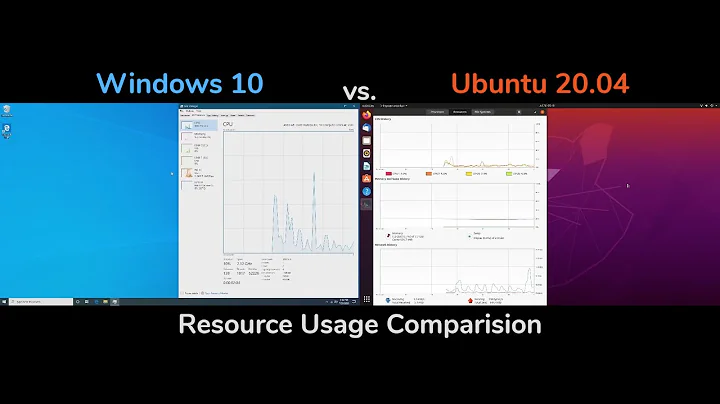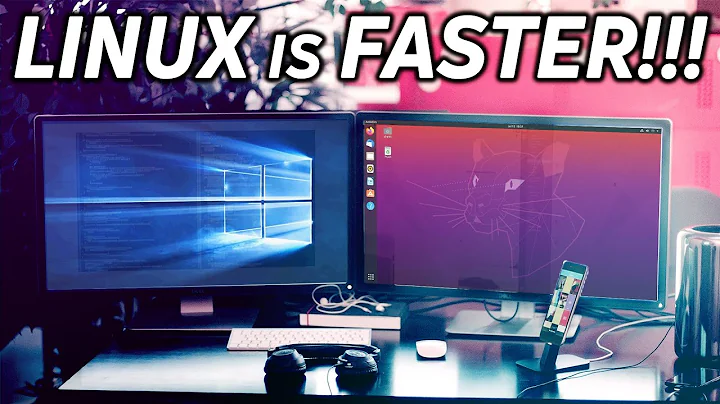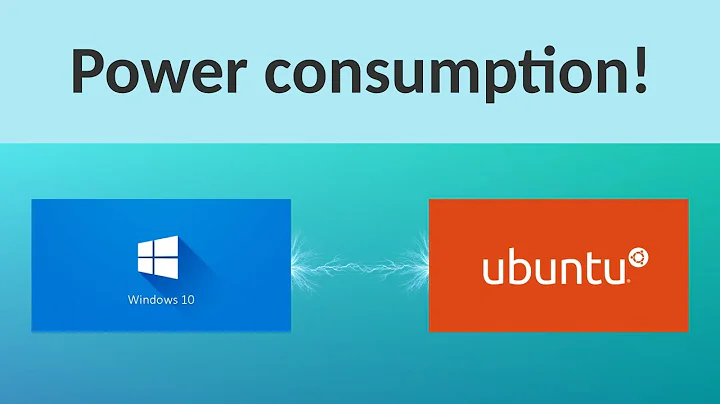Why does Ubuntu eat more power than Windows?
Solution 1
All the hardware in your computer has drivers specifically designed for Windows and not for Linux.
This happens for obvious reasons: Windows has 90% market share and Linux less than 1%. It's hard to convince a hardware manufacture to spend money developing something for less than 1% of the market.
The consequence is that a lot of the drivers that Linux uses are "second grade" drivers, some reverse engineered, some developed from scratch by the community and so on. They don't have the same performance as the driver made by the hardware manufacture.
So there's a distinct possibility that even after dimming the LCD light, reducing the CPU speed, as suggested by the user laurent-rpnet, your Ubuntu will still draw more power than windows.
Solution 2
It doesn't really matter all that much which distribution you are running (it matters a bit CPU wise); Linux' drivers are not power optimized in the degree they have been on Windows (or OS X for that matter). Actually, one of the main focus points for Windows Vista/7 was power optimization, and they really succeeded in that matter (of course the manufacturer produced drivers needed to be updated as well, so sometimes you actually used more power after upgrading).
The money in Linux has always been in BIG IRON (as in server platform), and the drivers have thus mainly focused on performance. Power efficiency is mainly a thing of concern to end-users and it simply does not pay (for hardware producers) to put a lot of money into this market.
For comparison I could get a maximum of 1 h 50 m when running Ubuntu 8.04 on Acer Travelmate 6292 (screen dimmed way down), whereas I could just squeeze out close to four hours on Windows Vista. That was with power optimized drivers and power management software from Acer. If just using the built in software from Windows I lost close to an hour of battery time.
This really is not a new thing and it has not improved in a big way in the last few years either. Some Google searches can bring you up to speed on the matter.
Solution 3
PowerTOP will tell you what is causing your processor to wake up and run (contrary to what that page says, it will run on other platforms; it just won't show as much information).
Solution 4
If you have a dedicated graphics card then it is possible that it is staying on always. It consumes a lot of power and the laptop gets heated up pretty fast. Install bumblebee. It will turn off your dedicated graphics card and will run only the integrated graphics card. Hope this helps.
Solution 5
I don't agree. Maybe using the default installations you might be right, because Ubuntu starts without power management (2 hours battery life in my laptop).
By installing cpufreq utilities and setting the cpu governor to "powersave" using the integrated Intel graphics I get 7.5 hours of calculated battery life against the 6 hours and something on Windows. This using an MSI GT72 6QD laptop.
Related videos on Youtube
iUm
Updated on September 17, 2022Comments
-
iUm over 1 year
I play full screen video with maximum volume or
browse the Web with Wi-Fi.Under Windows 7 my laptop works ~5 hours.
Under Kubuntu 10.10 only ~2 hours.I've got an Acer Aspire 1810TZ. Battery wear degree 90%.
Installed:
acpid
acpi-support
pm-utils
upowerNot installed:
laptop-mode-toolsI like Linux and don't want to change it.
What to do to make it live longer?
-
 Admin over 13 yearsGuess this is not enough info to draw in a conclusion, but I'd check how ofter each system is using your wifi, which consumes quite a lot of energy... maybe kubuntu is hitting it much often. Get some sniffer (wireshark, etc) and leave it running while watching some movie, and compare later.
Admin over 13 yearsGuess this is not enough info to draw in a conclusion, but I'd check how ofter each system is using your wifi, which consumes quite a lot of energy... maybe kubuntu is hitting it much often. Get some sniffer (wireshark, etc) and leave it running while watching some movie, and compare later. -
aloha over 13 yearsI'd recommend you switch away from KDE. Try UNE 10.04, or Lubuntu.
-
ThatGraemeGuy about 13 yearsYou might want to edit your title/tag to say "Kubuntu" instead of "Ubuntu".
-
-
Lombas over 13 yearsI disagree. In a lot of devices, performance is directly linked with power. The CPU for instance can be dynamically under clocked to reduce power. I can't be sure, but I think that without the proper driver the OS's power management won't work properly for that device. If the OS's power management doesn't work properly, the device would be running at an arbitrary performance level, that could be very power draining. Of course, not all the devices have performance levels, but WIFI, CPU, Bluetooth, IDE and SATA devices, have.
-
 Admin over 12 yearsBTW, your example is not really fair, since Acer offers no Ubuntu certified laptops, see ubuntu.com/certification; and check here to see how its power management is known to be poor: linux-on-laptops.com/acer.html
Admin over 12 yearsBTW, your example is not really fair, since Acer offers no Ubuntu certified laptops, see ubuntu.com/certification; and check here to see how its power management is known to be poor: linux-on-laptops.com/acer.html -
oligofren over 12 yearsThe world is not fair and this is no different ;-) Acer might be a bit worse than others, but a Dell or Lenovo will still run for longer on Windows than Linux. That's life until there is more money in the Linux end-user market. BTW: There was little value on the linux-on-laptops page: just a hundreds of links to blogs describing how they installed Linux on a Acer computer and their experiences with that. I would have expected a form of chart comparing Acer computers to others. What value did you expect to bring to the table with that URI?
-
 Admin over 12 yearsTry searching for your model there and you will find "Power mgmt - Doesn't Work". BTW: Google choose Linux for their laptops for a good reason; you can go to them and complain.
Admin over 12 yearsTry searching for your model there and you will find "Power mgmt - Doesn't Work". BTW: Google choose Linux for their laptops for a good reason; you can go to them and complain. -
oligofren over 12 yearsThis is not a thread on whether Linux is a good operating system - which it is. And I am not complaining: I am bringing facts to the table. If I was in Google's position, I would probably choose Linux too. I use Linux daily as a developer, and it fits that role brilliantly. But that is not the topic of this thread.
-
Peter Mortensen almost 7 yearsCan you add some how-to information (or at least some links) to your answer?
-
Zibri over 6 yearsapt update && apt install cpufrequtils indicator-cpufreq then set governor to powersave
-
vpathak about 4 yearsyou want to run powertop (after powertop --calibrate) and then fix/configure the biggest consumers and then the energy efficiency should be comparable to advertised one




